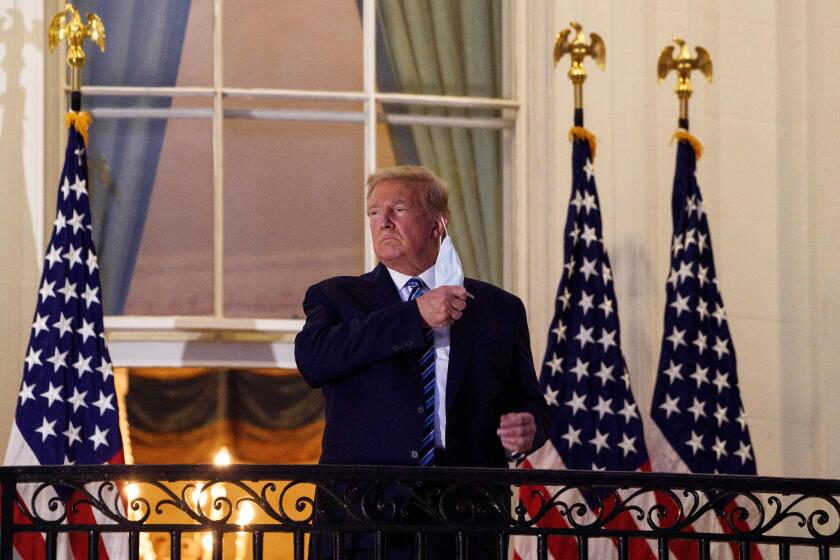When even Biden has an “Animal Crossing” island: Games are the new battleground state
“What does resistance mean to you?”
I didn’t know the woman’s voice on the other end of the line. No getting-to-know-you small talk transpired. In 30 minutes, we fast-forwarded to deeply personal, politically tinged conversation. One could answer honestly, as I attempted to do, or create a character and role-play. There was no real way to know during “A Call from the Resistance,” a work of improvisational telephone theater.
The one-on-one performance piece from local immersive outfit Capital W, which just completed a sold-out run of shows of “Fire Season,” a participatory work about our personal relationship to climate change, was, despite its name, not a slice of high drama.
The “resistance” in this case wasn’t some underground shadow group manipulating culture behind the scenes. The resistance was any one of us, asking us to lay bare our messy, complicated and sometimes even contradictory thoughts on politics.
But it also was designed to make the case that real progress often comes not from grand gestures but from a public that stays informed and actively participates in the political process, even if one’s extent of the latter is a vote.
Toxic individualism has led the U.S. to have one of the highest COVID-19 death rates in the world. It’s time for a new national myth.
Though it’s an intimate show, “A Call From the Resistance” was on my mind during my initial hours playing “Watch Dogs: Legion,” a new big-budget video game from Ubisoft, a game studio in the midst of its own soul searching after numerous accounts of harassment and toxicity were brought to light and a company whose stance on politics has been akin to Donald Trump’s “very fine people on both sides” line after a white supremacist rally in Charlottesville, Va., turned deadly.
“Legion,” at least in its early hours, has been hopeful. Its ambitious thesis is that we can play as anyone — a construction worker, a professor, a bartender, a nurse — and have a say in the future of a democracy. Sure, there’s also the clearly unsafe ability to fly on top of giant drones and the need to control moderately creepy spider robots, but the ultimate heroes are people struggling to pay rent or those fed up with the cost of prescription drugs. They’re normal people with recognizable concerns and relatable faults.
While Capital W’s small-scale and personal “A Call From the Resistance” was clearly developed amid the anxieties of 2020’s election season, “Watch Dogs: Legion” was created over multiple years and in tandem with a divisive moment in Western politics. The games stand as examples on opposite ends of the spectrum of how we’re seeking to make sense of the world through play. This year, in particular, our stay-at-home lifestyle has accelerated the theory that games are the dominant medium of our time.
And games, of course, despite corporate pleas to the contrary have always been political.
Even the recent release of older Mario titles courtesy of “Super Mario 3D All-Stars” reminded us that we’ll find topical messages, such as the need to address the climate crisis, in such unexpected places as 2002’s “Super Mario Sunshine.” More recently, the subject of disinformation has been a favorite of game creators.
Trump culture, on display at his Tulsa rally, is like an elaborate and dangerous alternate-reality game. Key words signal an in-the-know audience.
It’s at the heart of the story setup for “Watch Dogs: Legion,” but has been explored with humor in “Astrologaster,” a Shakespearean-era narrative tale about the mistrust in science when it’s inconvenient. And it’s explored with tension in a game such as “Through the Darkest of Times,” which transported us to the early days of Hitler-led Germany and challenged players to keep a resistance movement alive amid constant attempts from the government to silence and discredit it.
The role, however, of games in culture and politics continues to evolve. One change is a broader understanding of the social network power of the medium and the culture that surrounds it.
The presidential campaign for Joe Biden took the former vice president’s message to “Animal Crossing,” where players could visit a Biden HQ island. And on Oct. 19, Rep. Alexandria Ocasio-Cortez (D-N.Y.) proved to be an affable Twitch personality when she brought a low-key get-out-the-vote effort to indie game sensation “Among Us.” Anyone who caught a bit of Ocasio-Cortez’s Twitch stream could see the appeal of “Among Us,” a simple game with goofy art that’s full of jovial and conniving moments. Yet days later, showing that the participatory nature of games makes them not just a place for entertainment but a cultural battleground, “Among Us” was subject to a pro-Trump spam attack that ruined an untold number of matches.
While Ocasio-Cortez’s decision to speak to her fanbase via Twitch can be seen as a savvy political move by a young politician, it also made clear that holding to long-held stereotypes about games is not only out of touch but downright dangerous. We’re not that long removed from the assumption that games are made by white men for white men, which led to, as Politico recently labeled it, “a disinformation campaign” to protect such beliefs.
That effort became known as Gamergate, which this publication and others have cited as a blueprint for Trump’s vitriolic attacks and Twitter dragging. That’s because it galvanized a community made up largely of men who believed their worldview is threatened by the media, immigration, political correctness — just about anything that challenged a MAGA philosophy.
Over the past four years this disinformation campaign ultimately morphed into its own game-like endeavor. We wrote last spring about how the proliferation of conspiracy theories, some boosted by the president in the forms of a retweet or a refusal to condemn the source of them — many springing from the internet message board-birthed QAnon — has itself become a twisted ARG, or alternate reality game, a concept that has become only more crystallized in the weeks leading up to the election and the attempts to instill fear that the process is rigged.
Trump’s statements on the conspiracy theory QAnon — that he knows its followers “are very much against pedophilia” and that they “love our country” and “supposedly” support him — lends validity to their beliefs, such as the false Pizzagate claim that Hillary Clinton ran a pedophile ring in a restaurant basement. While not strictly an endorsement, Trump’s words provide QAnon with an imaginary game board, one on whichthere’s no elaborate puzzle or tidy solution, but it does provide followers constant fuel to hunt for the next conspiratorial breadcrumb until fiction turns into a much louder fiction.
Think of it as a Monopoly board, only instead of passing “Go,” the little square reads “Fake News.”
That’s exactly what young game designer Sindi Breshani did with her game “Propaganda,” a Monopoly-inspired tabletop game she began while working toward a masters at London’s Royal College of Art. She’s exhibited the board game at art galleries, and it was included as part of this year’s IndieCade, a yearly celebration of experimental and adventurous games.
“Through the Darkest of Times,” set in Nazi-era Germany, asks players: Would you resist? Its developers say that if your game doesn’t include the horrors of the Nazi regime then your game shouldn’t include Nazis.
“Propaganda,” she says, was inspired by her own shift in worldview, having been born and raised in Albania and only later discovering that the narratives about her country she was told as a child were often not grounded in facts. In London, and amid the Trump/Brexit era, Breshani asked herself how people do or don’t recognize when they’re living in something akin to a dictatorship. She put the same question to her parents.
“They would say things without even considering them,” Breshani says, noting Western countries were often spoken of in derogatory terms — think of someone who says “China virus” rather than COVID-19, as a modern example.
“I can give you the most absurd thing,” Breshani says. “The party had a shortage of food. So there was this idea that if you eat fish with cheese you get poisoned. So many people thought they were actually poisoned.” To this day, Breshani says, “I cannot eat fish with cheese,” though she laughs at the ridiculousness of it now.
Figurines in her game represent politics, religion, science, the news media and social media. The goal is to gain followers, which can be accomplished by being turned into a meme, positive or negative, or mastering Facebook algorithms, but you can lose them by having factual reporting come to light or even a negative edit on a Wikipedia page.
It’s a game, more or less, about the hunt for information, with players tasked with boosting a worldview whether they agree with it or not. Think of Trump’s calls to “liberate” states from stay-at-home orders or to distract from from protests by shouting “antifa” and “law and order,” where simply amplifying unsubstantiated information continues to destabilize, ultimately prolonging the spread of disinformation and turning us all into unwitting players.
Breshani has been impressed by how easily kids grasp the concepts of the game.
“We embody the characters of the game,” Breshani says. “When I play with kids, they say, ‘Oh, I should have been the pope.’ Or, ‘I am Donald Trump and I can do anything.’ So they start to make fun of all these things, but they end up having the conversations that I want them to have. It’s not a pure game for entertainment. It’s a platform to come together and talk about these things.”
It’s also a lesson. Play is not only a learning tool when we’re young; it provides rules and structure to what we choose to believe as we get older.
In an ARG, the end is often less fulfilling than the hunt for narrative strains along the way. It’s less about winning, at least in the traditional sense, and more about not losing and keeping the story alive.
Conspiracy theories fed by QAnon aren’t impacting the election season simply because a once-fringe movement is making a lot of sense. Language matters, and when Trump in a presidential debate spoke directly to members of a far-right hate group, telling the Proud Boys to “stand back and stand by,” it not only provided a narrative to a point of view, it expanded the area of play.
Breshani cites the work of noted author, designer and ARG developer Jane McGonigal, in which some of the defining characteristics of a game, especially a feedback loop and voluntary participation, can be applied to help us make sense of political messaging.
“To me, games and reality are very similar,” says Breshani. “In our reality, we have a goal, we have stories and we have rules, and fear and feedback is all based on those systems.”
More to Read
The biggest entertainment stories
Get our big stories about Hollywood, film, television, music, arts, culture and more right in your inbox as soon as they publish.
You may occasionally receive promotional content from the Los Angeles Times.













